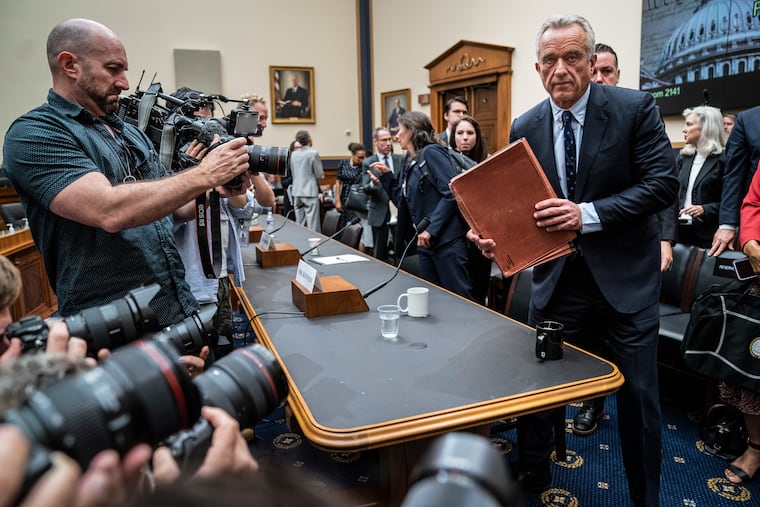RFK Jr. is right about one thing: harmful food additives must go
The FDA does not ban potassium bromate or brominated vegetable oil, but Pennsylvania's HB 2117 proposes to — and that's a good thing.

Robert F. Kennedy Jr., Donald Trump’s pick to head the U.S. Department of Health and Human Services (HHS), wants to purge harmful food additives from the food supply, one step in a plan to combat what he calls the “mass poisoning” of Americans.
While experts warn that many of Kennedy’s policies could spell disaster for a fragile American health system, one proposal could benefit all of us, and Pennsylvania lawmakers should pay attention.
Many chemical compounds are permitted in American food products that are otherwise regulated or banned in peer countries because of documented associations with chronic disease. Potassium bromate (PB) and azodicarbonamide (ACA), two bread leavening agents, are banned in the European Union because of their links to various chronic diseases, from respiratory illness to cancer. In addition, ACA is commonly used in “leavening” yoga mats.
In my four years of medical school, we extensively covered agents that increase the risk of chronic diseases, such as tobacco and alcohol, but rarely discussed these common chemicals. With cancer rates rising in younger people, some cancer experts hypothesize that environmental exposures and lifestyle are to blame, which includes the food we put in our bodies.
Our state must pass House Bill 2117. Introduced by State Reps. Melissa Shusterman (D., Paoli) and Natalie Mihalek (R., Allegheny) in 2024, it would amend Title 3 of the Pennsylvania Consolidated Statutes to prohibit the use of PB, brominated vegetable oil (BVO), and beta hydroxy acids (BHA) by 2027.
This legislation was introduced with bipartisan support because our health is a nonpartisan issue. While this bill does not target all harmful food additives, it is a great start.
Legislation like this is unfortunately necessary because the Food and Drug Administration, the agency tasked with protecting Americans from unsafe food, still labels PB and ACA as “generally recognized as safe,” or “GRAS.” Current regulations permit ACA and PB amounts of 45 and 75 parts per million, respectively, arguing that additive concentrations within those limits constitute a negligible risk to consumers. Other additives hiding behind the GRAS veil include artificial sweeteners (”non-nutritive sweeteners”), which are associated with heart disease, stroke, and all-cause mortality. The FDA has explicitly disagreed with these findings.
However, the agency does not review every current food additive, deferring to individual food companies to conduct their own safety research. This should immediately set off alarm bells — the foxes are guarding the henhouse. Even fast-food chains, such as Subway, eliminated the use of ACA in their products in 2014, but the federal government has done nothing on this. What does it say about the American regulatory apparatus when Subway takes a more reasonable stance regarding a suspected carcinogen than the FDA?
One state has already taken matters into its own hands. The California Food Safety Act will institute fines for the manufacturing, sale, and/or distribution of harmful food additives in any food products in the state beginning in 2027. Given California’s substantial market power, it is no surprise that its 2008 ban on trans fats set the precedent for the removal of such compounds from the FDA’s GRAS directory in 2015.
If Pennsylvania can follow California’s lead, we can not only remove disease-causing additives from our state’s food but also spur action at the national level.
The brunt of the costs would be borne by the food companies that currently utilize these chemicals, so maintaining the status quo is in their interests. Understanding this, the National Confectioners Association, a lobbying group representing candy companies, has released multiple statements questioning the risks posed by these food additives. But our public health policy shouldn’t be influenced by a special interest group whose website includes sections such as “Advocating for Chocolate and Candy” and “The Power of Sweet.”
The FDA’s recent ban on red dye No. 3 is cause for optimism, but not complacency. We should act at the national level by removing the GRAS label from harmful additives like PB and ACA and/or overhauling the FDA’s regulatory process for food additives. Kennedy’s HHS may actually be receptive to such changes.
But until the Trump administration can demonstrate a commitment to evidence-based health policy, Pennsylvania must first act on its own. We can no longer allow ourselves to be poisoned.
Vinayak Ahluwalia is a fourth-year medical student and associate fellow at the Leonard Davis Institute of Health Economics at the University of Pennsylvania.